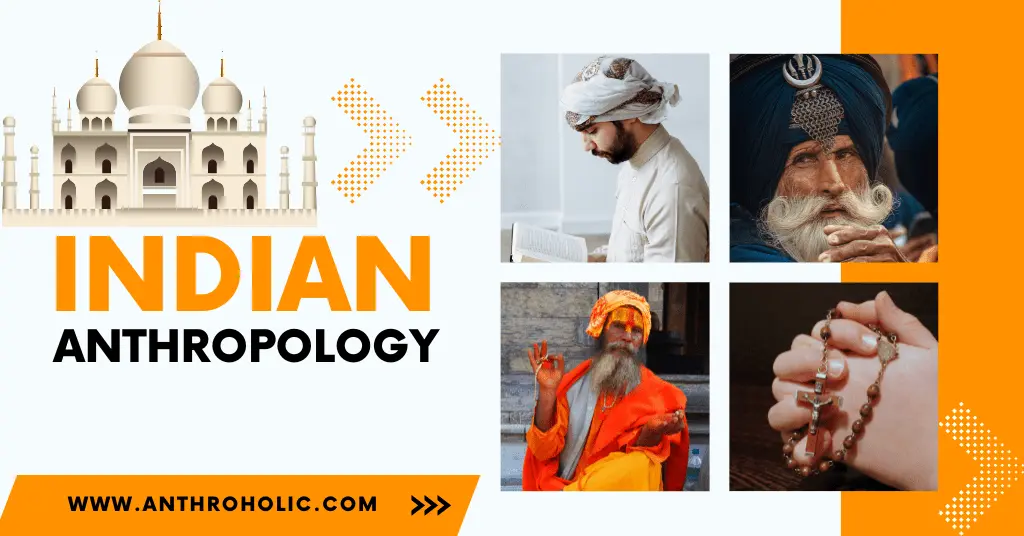AI Answer Evaluation Platform Live Now. Try Free Answer Evaluation Now
Indian Anthropology
Indian anthropology, as the term suggests, focuses specifically on the anthropological aspects of the Indian subcontinent. With a rich and diverse history that spans thousands of years, India offers an unparalleled opportunity for anthropological studies. The subcontinent boasts a vibrant tapestry of languages, religions, customs, and traditions that have evolved and intermingled over time, giving rise to a unique cultural mosaic.

History of Indian Anthropology
Early Beginnings Indian anthropology can trace its roots back to the ancient texts and scriptures that form the foundation of Indian civilization. The Rigveda, one of the oldest known texts, contains descriptions of the people, their beliefs, and their way of life, providing early evidence of anthropological inquiry in India (Narayanan, 2015). British Colonial Influence The systematic study of Indian anthropology, however, began during the British colonial era. British administrators and scholars took a keen interest in understanding the complex social structures and customs of the Indian people to govern more effectively (Bose, 2013). Key figures in this period, such as Sir Herbert Risley and G.S. Ghurye, laid the groundwork for the modern discipline of Indian anthropology. Post-Independence Developments Following India’s independence in 1947, anthropological research in the country shifted towards exploring the social and cultural dynamics of an emerging nation. Scholars like M.N. Srinivas, Irawati Karve, and A.K. Sen played a pivotal role in shaping the discipline by incorporating sociological theories and methods, resulting in the development of a distinct Indian School of Anthropology (Shah, 2015).
Key Findings in Indian Anthropology
- Caste System and Social Mobility: The caste system, a unique social stratification system in India, has been a significant area of anthropological research. M.N. Srinivas’s concept of ‘Sanskritization’ explains how lower castes can emulate the customs and rituals of higher castes to achieve upward social mobility (Srinivas, 1956). This concept remains relevant today as it sheds light on the complexities of caste dynamics in modern India.
- Tribal Studies: India is home to numerous indigenous tribes, each with their unique cultural practices and social organizations. Indian anthropologists have made significant contributions to the study of these tribal societies, highlighting the importance of preserving their cultural heritage and addressing their socio-economic needs (Xaxa, 2005).
- Religion and Rituals: India’s diverse religious landscape offers a wealth of anthropological insights. Studies on religious practices, rituals, and beliefs have not only enriched our understanding of Indian spirituality but also highlighted the role of religion in shaping social and cultural norms (Doniger, 2010).
- Language and Identity: The linguistic diversity in India has been a subject of extensive research, revealing the intricate relationships between language, culture, and identity. Linguistic anthropology has uncovered the role of language in constructing and maintaining social boundaries and influencing inter-group dynamics (Pattanayak, 1990).
- Gender and Sexuality: Indian anthropology has also made significant strides in the study of gender and sexuality, exploring the complexities of gender roles, power dynamics, and sexual norms in Indian society. This research has contributed to a more comprehensive understanding of the impact of culture, tradition, and religion on gender and sexual identities (Nanda, 2000).
Anthropology in Contemporary India
- Addressing Social Issues: Anthropological research in India has played a critical role in informing government policies and interventions in areas such as healthcare, education, and social welfare. By providing a nuanced understanding of the socio-cultural contexts of different communities, anthropology helps in the development of more effective and targeted policies (Shah, 2015).
- Cultural Preservation and Revitalization: As India undergoes rapid urbanization and globalization, preserving its rich cultural heritage becomes increasingly important. Anthropologists play a key role in documenting and promoting the preservation of traditional customs, practices, and art forms that are at risk of being lost (Menon, 2013).
- Bridging the Urban-Rural Divide: India’s urban-rural divide poses significant challenges in terms of socio-economic development and social harmony. Anthropological research offers valuable insights into understanding the unique challenges faced by rural and urban communities, enabling the development of effective strategies to bridge the gap (Fernandes, 2006).
Conclusion
Indian anthropology has made significant strides since its early beginnings, contributing to a deeper understanding of the complex social, cultural, and historical fabric of the Indian subcontinent. By exploring diverse aspects of Indian society, anthropologists have not only enriched our knowledge of India’s rich heritage but also played a crucial role in addressing contemporary social issues. As India continues to evolve and face new challenges, the discipline of anthropology remains more relevant than ever, providing a unique lens to study and appreciate the nation’s incredible diversity.
See Also
References
- Basu, A. (2016). Biological Anthropology in India: A Brief Review. Anthropological Review, 79(2), 131-147.
- Beteille, A. (2012). Sociology and Social Anthropology in India. Economic & Political Weekly, 47(35), 33-40.
- Bose, N.K. (2013). Contributions to Indian Sociology: A Brief History. Sociological Bulletin, 62(1), 4-20.
- Chakrabarti, D.K. (2013). India: An Archaeological History. Oxford University Press.
- Doniger, W. (2010). The Hindus: An Alternative History. Penguin Books India.
- Fernandes, L. (2006). India’s New Middle Class: Democratic Politics in an Era of Economic Reform. University of Minnesota Press.
- Menon, N. (2013). Everyday Nationalism: Women of the Hindu Right in India. University of Pennsylvania Press.
- Nanda, S. (2000). Gender Diversity: Crosscultural Variations. Waveland Press.
- Nanda, S., & Warms, R.L. (2011). Cultural Anthropology. Cengage Learning.
- Narayanan, V. (2015). Reflections on Indian Anthropology: Early Sources and Recent Trends. International Journal of Indian Studies, 5(2), 1-12.
- Pattanayak, D.P. (1990). Multilingualism and Mother-Tongue Education. Oxford University Press.
- Shah, A.M. (2015). The Indian School of Social Anthropology. Sociological Bulletin, 64(1), 1-19.
- Srinivas, M.N. (1956). A Note on Sanskritization and Westernization. The Far Eastern Quarterly, 15(4), 481-496.
- Xaxa, V. (2005). Politics of Language, Religion, and Identity: Tribes in India. Economic and Political Weekly, 40(13), 1285-1289.



